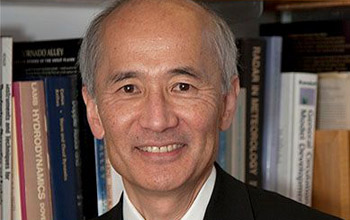News Release 12-208
National Science Foundation Selects National Center for Atmospheric Research Director Roger M. Wakimoto to Lead Geosciences Directorate
November 7, 2012
This material is available primarily for archival purposes. Telephone numbers or other contact information may be out of date; please see current contact information at media contacts.
The National Science Foundation (NSF) has selected Roger M. Wakimoto to serve as assistant director for the Directorate for Geosciences (GEO). Wakimoto will lead a directorate with an annual budget of approximately $1 billion in support of core research in the atmospheric, polar, earth and ocean sciences.
Currently, Wakimoto is the director for the National Center for Atmospheric Research (NCAR), which is sponsored by NSF. Prior to becoming NCAR Director, he served as associate director for NCAR's Earth Observing Laboratory. Wakimoto is a geophysicist with expertise in tornadoes, thunderstorms and other types of severe weather.
"Roger brings to NSF significant depth and breadth of knowledge in the sciences GEO supports," said NSF Director Subra Suresh. "His record of strong leadership will serve NSF and the scientific community well, given his outstanding work at NCAR and his dedication to basic research."
As the principal source of federal funding for university-based fundamental research in the geosciences, GEO addresses the nation's need to understand, predict and respond to environmental events and changes to use Earth's resources wisely. Basic research in the geosciences advances scientific knowledge of Earth's environment, including resources such as water, energy, minerals and biological diversity. GEO-supported research also advances our ability to predict natural phenomena of economic and human significance, such as climate change, weather, earthquakes, fish-stock fluctuations, and disruptive events in the solar-terrestrial environment.
GEO manages facilities and an academic research fleet, including the newly launched R/V Sikuliaq and the NCAR-Wyoming Supercomputing Center, which was dedicated last month.
Wakimoto was a professor in the Department of Atmospheric Science at UCLA, where he chaired the department. He has written or co-authored more than 100 peer-reviewed papers and served on numerous committees, panels and boards for NSF, the National Academy of Sciences, the American Meteorological Society and other organizations. He has won numerous awards and honors, including a scientific and technical achievement award from the Environmental Protection Agency for observations of air pollution and the Meisinger Award from the American Meteorological Society in recognition of his contributions to understanding mesoscale weather events.
Wakimoto will begin his NSF appointment in February 2013.
-NSF-
Media Contacts
Dana Topousis, NSF, (703) 292-7750, email: dtopousi@nsf.gov
Related Websites
National Center for Atmospheric Research: http://ncar.ucar.edu/
The U.S. National Science Foundation propels the nation forward by advancing fundamental research in all fields of science and engineering. NSF supports research and people by providing facilities, instruments and funding to support their ingenuity and sustain the U.S. as a global leader in research and innovation. With a fiscal year 2023 budget of $9.5 billion, NSF funds reach all 50 states through grants to nearly 2,000 colleges, universities and institutions. Each year, NSF receives more than 40,000 competitive proposals and makes about 11,000 new awards. Those awards include support for cooperative research with industry, Arctic and Antarctic research and operations, and U.S. participation in international scientific efforts.
Connect with us online
NSF website: nsf.gov
NSF News: nsf.gov/news
For News Media: nsf.gov/news/newsroom
Statistics: nsf.gov/statistics/
Awards database: nsf.gov/awardsearch/
Follow us on social
Twitter: twitter.com/NSF
Facebook: facebook.com/US.NSF
Instagram: instagram.com/nsfgov



